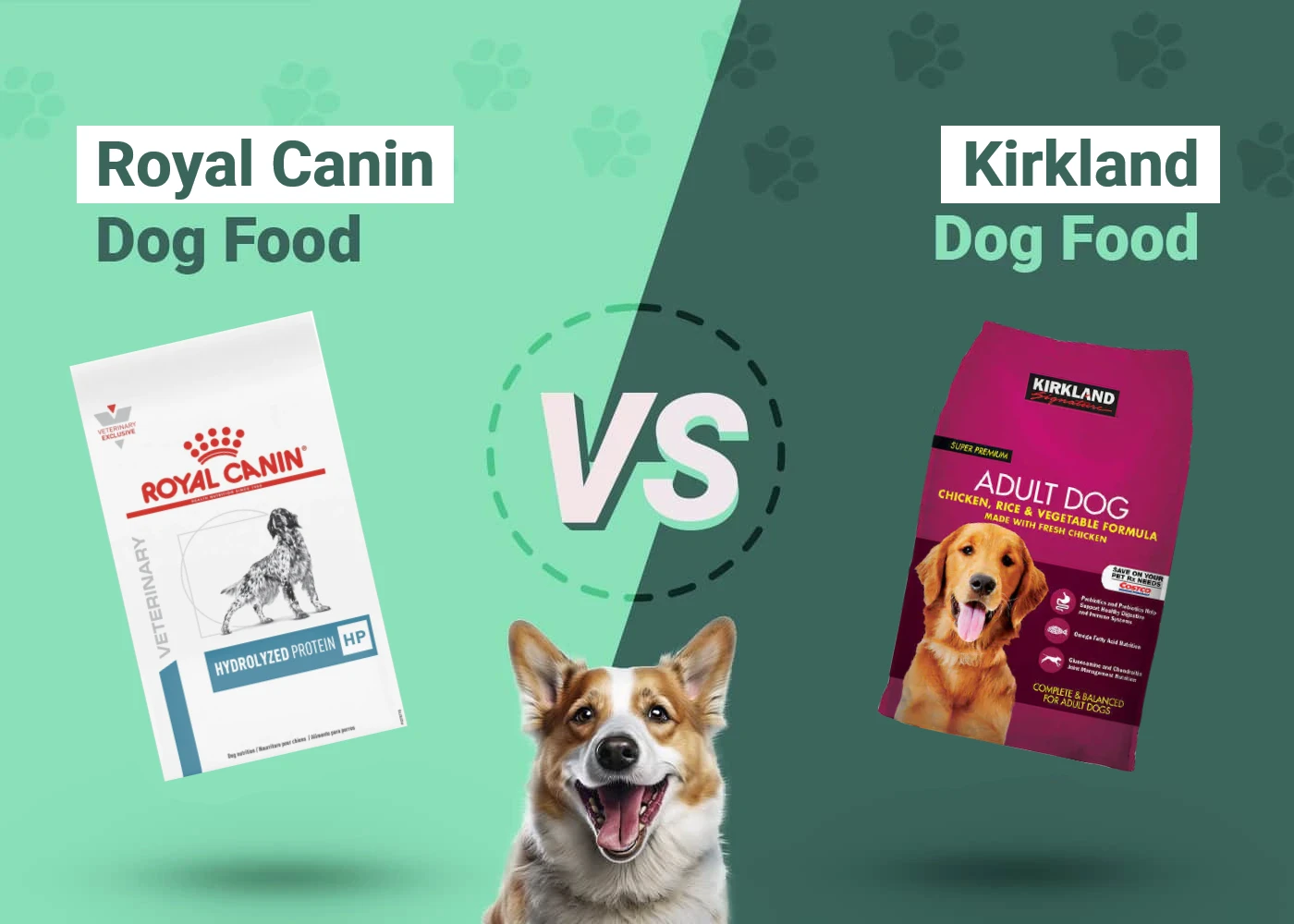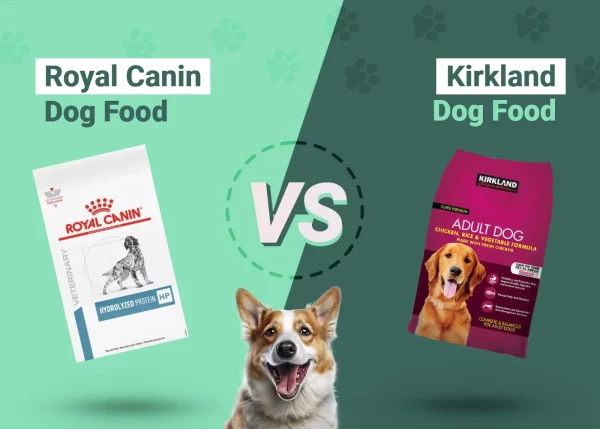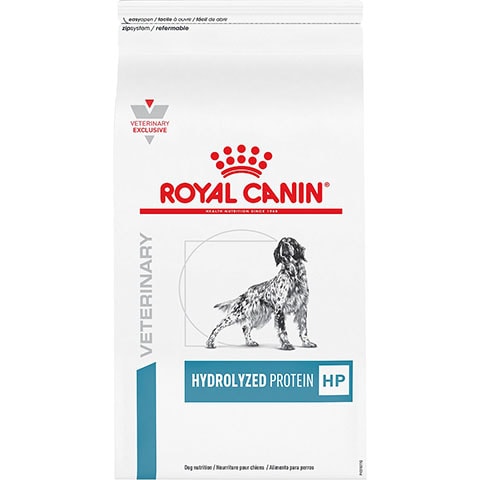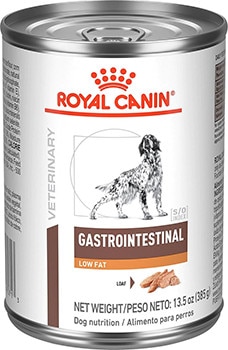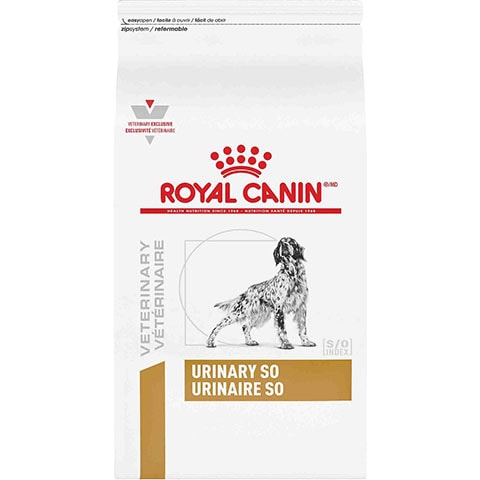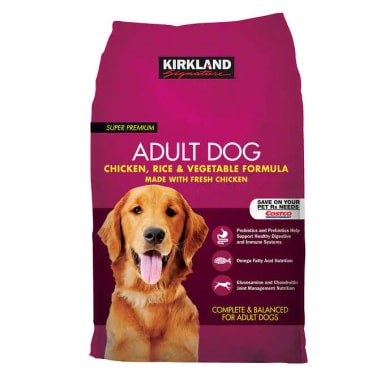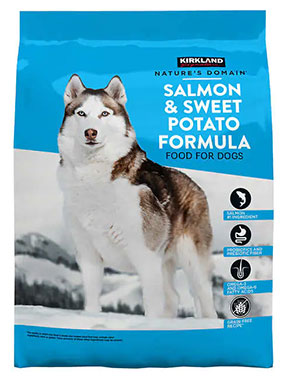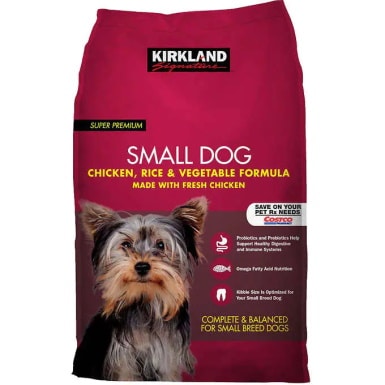Click to Skip Ahead
Finding a dog food that’s a great fit for your four-legged friend (meaning it’s healthy and they actually like it) is a struggle. There are so many brands available, so many ingredients, so much confusion…the list goes on. So, how’s a dog owner supposed to know which dog foods would be excellent to try out and which to avoid?
You’re in the right place to start on your journey to the best dog food for your pup because we’ve put together a quick comparison of two popular brands—Royal Canin and Kirkland. All you need to do is continue reading to find out where these dog foods come from, what their ingredients are like, whether they’ve had recalls, and more.
A Sneak Peek at the Winner: Kirkland
| Rating | Image | Product | Details | |
|---|---|---|---|---|
| Our Favorite |
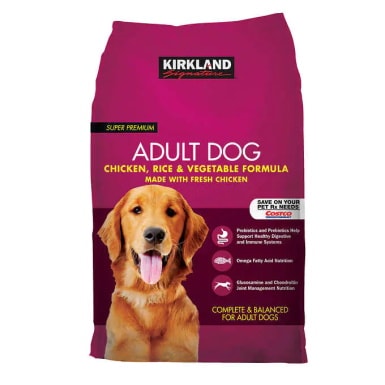
|
Kirkland Signature Adult Formula |
|
CHECK PRICE |
| Runner-Up |
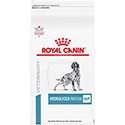
|
Royal Canin Veterinary Diet Hydrolyzed Protein |
|
CHECK PRICE |
Before we start, here’s a sneak peek at our winner, Kirkland! Kirkland has higher quality proteins in their food than Royal Canin (and seems to have better ingredients overall). The biggest concern here is the addition of peas in several of their recipes, but the rest is good enough that it could be a worthwhile risk, especially since more research is needed into the topic of peas being linked to possible heart disease in dogs.
Our two favorite products from them are Kirkland Signature Adult Formula Dog Food and Kirkland Signature Nature’s Dog Food. Read on to find out why!
About Royal Canin
Royal Canin was created in France in 1968 by Jean Cathary. Its U.S. launch happened in 1985.
Nutrition & Health
Jean Cathary was a veterinarian for horses and bulls before he started Royal Canin. It was through that work that he came to believe that nutrition could have a considerable impact on an animal’s health. Thus, Royal Canin was born.
Since then, Royal Canin has studied (and continues to study) the unique health needs of dogs down to the smallest detail and learned how even small nutritional changes to your pet’s diet can have large results. This continued study enables Royal Canin to make foods designed precisely for individual dogs according to breed and size. Each of their dog food recipes is specially formulated, so it gives a pet the exact minerals, vitamins, antioxidants, prebiotics, fiber, and more they require. They also collaborate with a host of experts, including veterinary and scientific ones, to deliver outstanding results.
- The 2003 launch of the VDiet recipe arose from a collaboration between Waltham Centre for Pet Nutrition and Royal Canin Research.
- The 2005 obesity clinic also created in collaboration with Waltham Centre for Pet Nutrition.
- The 2014 launch of GHA, a test that scans a dog’s DNA and gives vets the info they need from the genetic code to create individual, customized health plans.
Breed & Size Specific
One of the ways Royal Canin is able to create food that meets each dog’s specific nutritional needs is by making foods that are breed and size specific. In fact, their launch of AGR in 1980 was the first dog food designed for large breed puppies and served as a reference for others for the next 15 years. It wasn’t till years later, though, in 1997, that they built upon that. That’s the year they introduced size specific nutrition to the world (again, the first of its kind) that was based on not just the size of a dog but its age too.
Their first breed specific food came a couple of years later, in 1999, when they designed a food that was built to be simpler for Persian cats to eat with their jaw structure while also meeting their health needs. Breed specific food for dogs came around in 2002 with the launch of a food for Mini Yorkshire Terriers.
What does it really mean that a food is breed or size specific? Think about German Shepherds, who are known for being strong but also for having sensitive stomachs. The Royal Canin food for them is made with particular fibers and proteins that are highly digestible, so a German Shepherd’s insides are as strong and healthy as the outside.
Or think about the shape of your dog’s jaw and its ability to pick up food. Some dogs have shorter snouts or more blunted faces or overbites or underbites, all of which can give a pet trouble eating. Breed and size specific foods have kibble crafted specifically to make it easier for that dog to eat.
And with foods created explicitly for a single breed, your dog is getting everything they need nutritionally, from nutrients to amino acids, to stay healthy and strong.
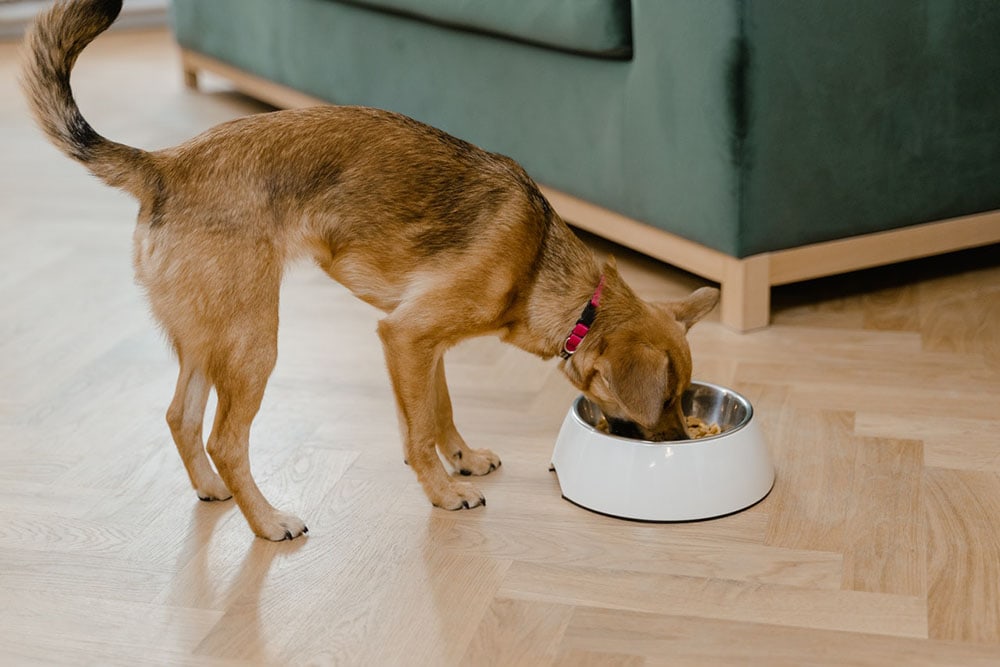
Ingredients
When it comes to the ingredients in Royal Canin, you’ll find they more often use meat by-products or meat by-product meals than real meat. They give the reason for this as it allows them to maintain their nutrient standards while still being able to customize foods while also allowing for a sustainable supply. Meat by-products and meat by-product meals are perfectly safe and do offer your pet nutrition, but if you’re looking for dog food with meat as the first ingredient, it will be difficult to find here.
And though it’s rare, a few of the Royal Canin recipes contain peas or legumes in some form, which have been linked to heart disease in dogs (although this requires more research).
- Breed & size specific nutrition
- Years of scientific health research
- On the pricier side
- Doesn’t tend to use real meat
About Kirkland
If you’re a Costco fan, you’ve likely seen Kirkland dog food in their stores as part of the Costco brand line. The food is made by Diamond Pet Foods in factories throughout the U.S.
Nutrition & Health
Kirkland dog food may not have years of scientific research into the health behind it, but it still offers your dog a lot when it comes to nutrition. It has different foods for each stage of life your pup is in and meets their nutritional needs for that life stage by including probiotics, essential vitamins and minerals, amino acids, omega fatty acids, glucosamine, chondroitin, fiber, and more. Overall, Kirkland is a nutritionally sound dog food line with formulas that meet the necessary AAFCO requirements for every stage of life and offer your dog all they need to stay healthy.
Breed & Size Specific
When it comes to foods created for specific breeds or dog sizes, Kirkland is definitely lacking. Whereas Royal Canin has dog food for different breeds and sizes within the breeds, Kirkland only has a single specified formula for small breeds. Their other recipe lines are targeted toward puppies, adults, and seniors. They also have a weight management formula.
If you’re looking to feed your dog according to its breed or size, you’ll likely do better with Royal Canin.

Ingredients
Kirkland does fare a bit better than Royal Canin when it comes to ingredients used. They use real meat as the first ingredient in most if not all, recipes, so you have a higher quality of protein with that. However, they use meat by-products and meat by-product meals to bulk things out.
Kirkland does use peas in some of their recipes, though, so be wary of that if you’re worried about heart health concerns.
They also have a grain-free dog food line for pups that have a grain intolerance. However, this isn’t very common in dogs—your pup is more likely to be sensitive to the protein in their food than the grains—so you might want to speak with your vet before going the grain-free route. Grains offer your pet fiber that improves their digestive health and carbs to keep them energetic.
- Higher quality protein
- Nutritionally sound
- Excellent price point
- Can only buy at Costco
- Has peas in some recipes
The 3 Most Popular Royal Canin Dog Food Recipes
Below you’ll find a quick rundown of three of the most popular Royal Canin dog food recipes available.
1. Royal Canin Veterinary Diet Hydrolyzed Protein Dog Food
This hydrolyzed protein food is wonderful for dogs that have sensitivities to common proteins found in food. Hydrolyzed proteins (soy in this case) are more easily digested than regular proteins, making them less likely to cause an allergic reaction. And this food still packs 19.5% protein for your dog!
This dog food also has a specialized blend of fibers designed to boost your pup’s digestive health, so those prone to upset stomachs and diarrhea should see improvement.
This Royal Canin food is also free of peas, so you don’t need to be concerned about your pet’s heart health.
- Hydrolyzed protein for easier digestion
- Great for those with food sensitivities
- Pea free
- Does have chicken fat, which could be bad for those with chicken allergies
2. Royal Canin Veterinary Diet Gastrointestinal Low-Fat
Though this Royal Canin wet dog food has pork liver, pork plasma, and pork by-products, it only contains 6% crude protein. That’s not a ton. On the flip side, this food is designed to be highly digestible for pups who have difficulty digesting fats (hence, the low-fat part). The food contains a host of dietary fibers and prebiotics to further aid in healthier digestion.
Then there’s the S/O Index that helps reduce the risk of crystals forming in the bladder by creating a hostile environment. If your dog is prone to that sort of thing, this food is an excellent choice.
- Low-fat
- Helps reduce the risk of crystal formation in the bladder
- Improves digestion
- Low in protein
- May not contain enough calories for larger breeds
3. Royal Canin Veterinary Diet Urinary SO Dog Food
If your pet has issues with their urinary tract system often, this dog food could help. It contains less magnesium than other foods to help keep stones from forming and dissolve stones that are already there. It also increases how much urine your pet releases to rid the body of excess minerals that cause stones in the first place.
It also offers your dog 17% crude protein to keep the rest of their body healthy and strong. Plus, it contains plenty of grains to up the fiber content of your pet’s diet. One thing it doesn’t have, though, is peas, so no heart health concerns here!
- Great for dogs who deal with urinary tract issues
- High protein
- Pea-free
- Not suitable for all dogs
- Pricey
The 3 Most Popular Kirkland Dog Food Recipes
And here’s a look at some of the most popular and beloved Kirkland dog food recipes from Costco.
1. Kirkland Signature Adult Formula
This adult formula contains real chicken as the first ingredient for a high-quality protein, then boosts the amount of protein with the addition of eggs. All in all, there’s 26% crude protein in this one.
Brown rice is included as a highly digestible carb, and the food’s taste is enriched with veggies, fruits, and herbs.
There’s also a boost of probiotics and prebiotic fiber to improve the state of your pup’s digestion, while glucosamine and chondroitin support the health of the joints.
- Chicken as the main ingredient
- High protein
- Good for digestive health
- Supports healthy joints
- Contains peas
2. Kirkland Signature Nature’s Domain Dog Food
If you want a dog food that has something other than chicken or turkey, you’re in luck with this one as it has salmon meal instead. However, salmon meal is all it has; there’s no whole salmon here. That salmon meal offers your dog 24% crude protein, though, which is excellent.
This dog food is also one of Kirkland’s grain-free recipes. Not all dogs require grain-free foods, so talk with your vet before you start them on a grain-free diet.
The Kirkland Salmon Meal & Sweet Potato recipe also provides your pet with a ton of digestive support in the way of probiotics and prebiotic fibers, like chicory root.
- Good for digestive health
- High protein
- Not all dogs need grain-free diets
- Contains peas
3. Kirkland Signature Small Dog Formula
This is one of Kirkland’s small breed-specific recipes.
With real chicken as the top ingredient and a whopping 27% crude protein, this Kirkland dog food provides your pup with a lot of high-quality protein. It also offers your dog a good amount of prebiotic and probiotic fiber sources designed to help those with sensitive stomachs.
This food does contain peas, though, so this might not be the best fit if that’s a concern.
- High protein
- Chicken as first ingredient
- Good for sensitive stomachs
- Small breed specific
- Has peas
- Not suitable for larger breeds
Recall History of Royal Canin and Kirkland
When it comes to food recalls, Royal Canin seems to have had three total.
The first was in 2006, when the company recalled six Veterinary Diet recipes due to elevated levels of D3.
The next was in April 2007, during the melamine scare, when various dry dog foods were recalled.
Finally, the last recall was the same year, in May, when they recalled more foods for the same contaminant (although this could be considered a continuation of the April recall). This time 23 recipes were recalled for possible melamine contamination.
As for Kirkland dog foods, they seem to have only had two recalls in their history.
The first for them was in April 2007 for, you guessed it, the melamine scare. Compared to others, though, Kirkland only recalled a single wet food recipe during this time.
Their bigger recall came in May 2012 and was due to possible salmonella contamination. This time seven of their recipes were recalled.
Royal Canin vs Kirkland Comparison
Now that we’ve covered the basics, it’s time to go head-to-head on the comparison between Royal Canin and Kirkland.
Taste
When it comes to how a food tastes, with Royal Canin, it will be a matter of trying out foods to see whether your dog likes them. The company doesn’t list the flavor of the food on the bag, so you have no way of knowing what it might taste like till you read the ingredient list.
With Kirkland, at least, you know from the name of the food what kind of taste your dog will be getting, whether it’s salmon meal, chicken, or something else.
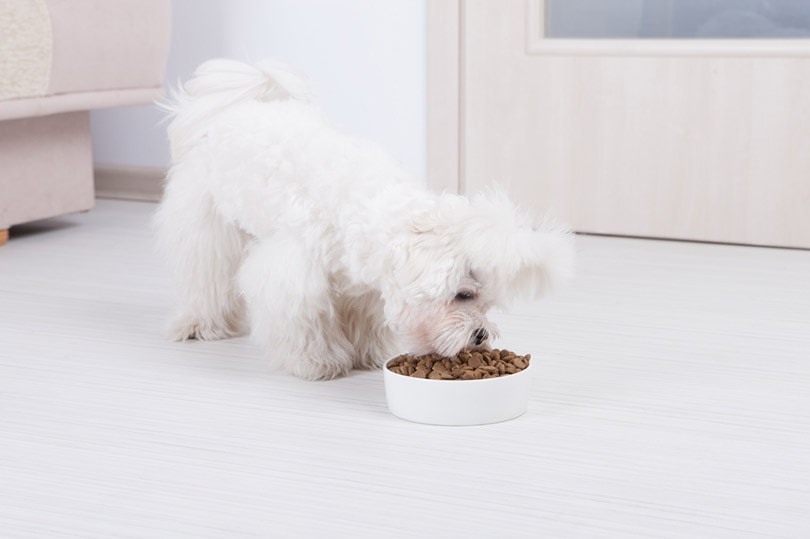
Nutritional Value
Both dog food brands meet the AAFCO nutritional requirements for dog food, so either technically would work for your pet.
However, while having recipes that are researched to precisely target certain breeds and dog sizes, Royal Canin lacks high-quality proteins in their meals, as none seem to have real meat in them. Many of their recipes also don’t contain probiotics, which are known to improve the health of the gut. That said, most of their meals will provide a good dose of protein for your pet and can help with specific health issues (depending on the recipe).
Kirkland seems to come out a bit ahead of Royal Canin on the nutritional front as they use actual meat as the main ingredient for most of their recipes (but not all!). This ensures your pup is getting a high-quality protein instead of a low-quality one. Kirkland’s recipes also seem to be a smidge higher in protein amounts. Kirkland food also contains plenty of probiotics and prebiotics to aid digestion and gut health. However, many recipes include peas in some form, which may be linked to heart disease in dogs.
Price
Kirkland is the clear winner when it comes to price.
Royal Canin only sells food in smaller bags, and those bags can get rather expensive.
Because Kirkland is a Costco brand, they have much larger bags of dog food, so you’re buying in bulk and for a much lower price.
Selection
When it comes to the selection of dog foods available, Royal Canin comes out far ahead with its wealth of specialized diets. Because Kirkland only has one size-specific food, with the rest going according to life stage or weight management, they have far fewer options.
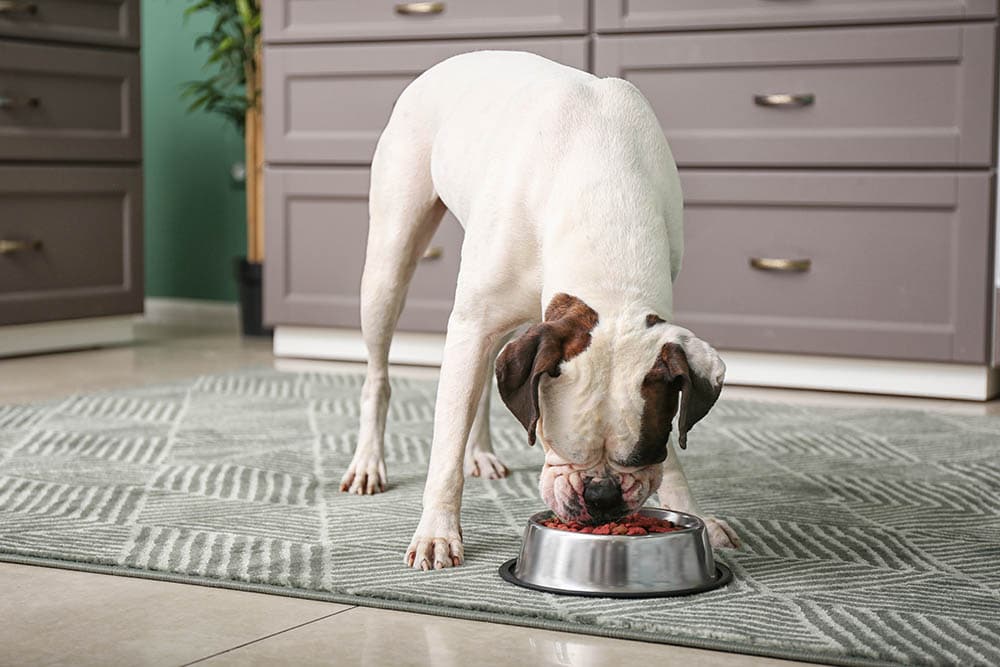
Overall
All in all, it’s kind of a toss-up between the two brands.
On the one hand, Royal Canin has plenty of recipes to offer that are specially designed just for your dog. But they don’t offer high-quality proteins in their meals or additions such as probiotics. They’re also incredibly pricey.
On the other hand, Kirkland provides your pup with high-quality proteins and probiotics but has a much smaller selection from which to choose. Several of their dog foods also contain peas, which can be iffy. But they’re also a much cheaper brand that still has great ingredients (for the most part).
It mostly boils down to if you’d rather feed your pet a food designed just for them that’s a bit lower quality or a food that’s more generalized that has better quality ingredients but also contains peas.
In Conclusion
In our opinion, despite the addition of peas in some of their recipes, Kirkland offers your dog a much higher quality protein and better ingredients. And because they make food for all life stages, there’s something there for everyone.
That isn’t to say that Royal Canin doesn’t have its pluses. Their targeted recipes meet your dog’s nutritional needs exactly, but they also don’t use real meat in their recipes, so the protein quality is lower. They’re also much more expensive than Kirkland.
So, Kirkland comes out just a bit ahead, but it’s pretty close to a tie with these two dog food brands.

